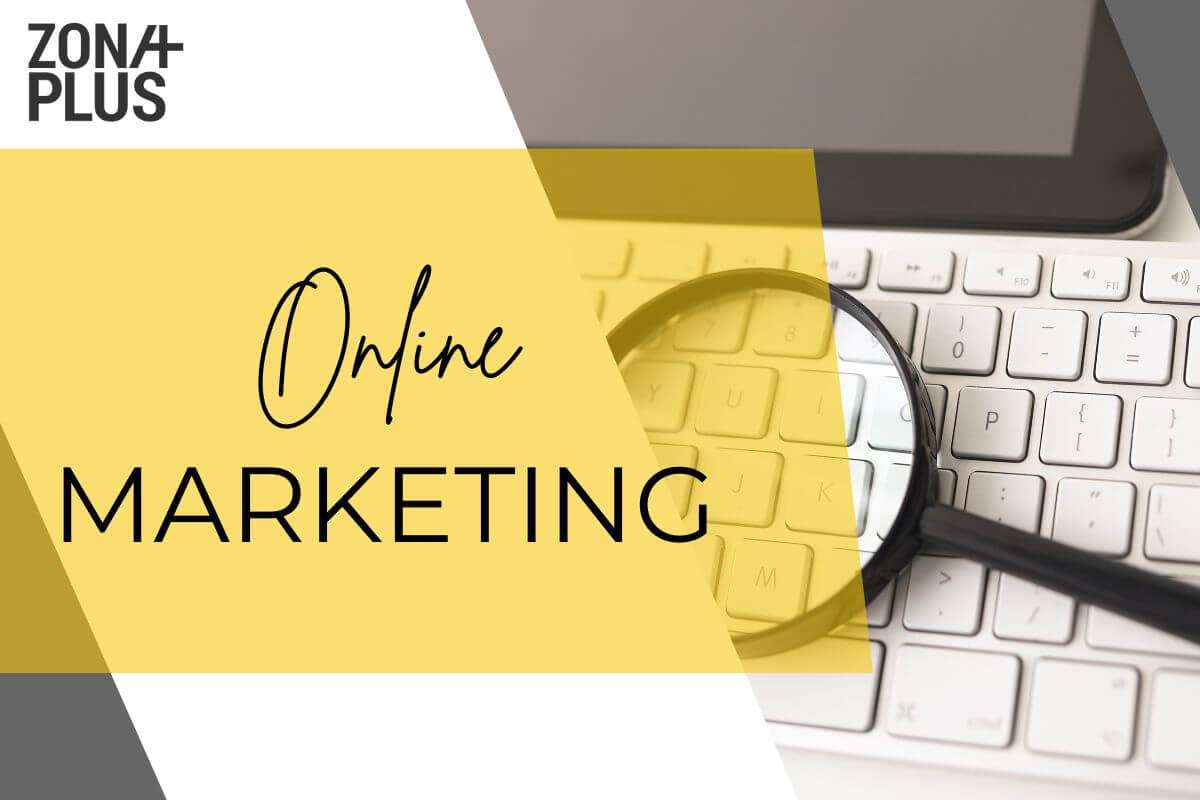
Online marketing is all those marketing activities you do online (logically), everything from social media advertising to SEO. Although it is often assumed that online is also digital, this is not quite the correct assumption. Digital marketing and online marketing have their similarities but also their differences. As well as advantages and disadvantages.
Online marketing enables your business to reach a wider audience through the Internet.
Before we move on to the "official" part with definitions and explanations, we will also say that online marketing is something that you should not underestimate and not take lightly.
We've been in the digital age for quite some time now, and what do most people do before making a purchase? They search online.
Unlike traditional marketing, which relies on TV, radio and print media, online marketing uses digital channels. They help you build your brand and attract potential users, clients or customers.
And if you want to reach those who search (and convert them into your future users, clients or customers) – you also need to be online.
If you want to grow and be competitive, of course.
Although the terms digital marketing and online marketing are often considered synonymous, they are not the same.
Digital marketing includes various tools and methods using both electronic devices and the Internet to communicate with target audiences.
Online marketing, on the other hand, strictly focuses on tactics implemented on the Internet.
In other words, all online marketing is digital marketing, but not all digital marketing is online marketing.
Did we complicate it a bit? We will explain with examples.

SEO (Search Engine Optimisation) - the process of optimising a website to improve its position in search engine results, thereby increasing organic traffic.
PPC (Pay Per Click) - advertising in which you pay every time someone clicks on an ad, is used in search engines and social media.
Email marketing - sending promotional messages or newsletters to a target group of users via electronic mail.
Marketing on social media - promoting products or services on platforms such as Facebook, Instagram, X (and apparently very soon also TikTok) through posts, ads, and user interaction.
Content marketing - creating and distributing valuable, relevant, and consistent content to attract and retain a clearly defined audience.
TV commercials - digital commercials shown on television that target a wider audience.
SMS marketing - sending text messages with marketing content enables direct communication with consumers.
Digital posters - electronic advertising spaces in public spaces that display variable digital ads, visually attractive and effective for attracting passer-by's attention.
Radio commercials - broadcast on digital radio stations, which can also target specific demographic groups of listeners.
Online marketing - all of the above online marketing strategies also fall under the broader concept of digital marketing, which uses the Internet and online platforms to reach the target audience.
If you are a beginner in digital marketing, it is essential to create a strong presence. You can achieve this by writing a blog where you will share content about the most current trends and methods within digital marketing.
Also, you should be active on social media because this can contribute to your recognition in a professional sense. And social media are also an excellent platform for connecting with other professionals and potential employers.
Educate yourself as much as possible and at every opportunity, and try to gather some practical experience along the way.
If possible, engage in apprenticeships or projects as an independent associate. It will enable you to apply what you have learned in your projects, develop your abilities and create a professional portfolio that will set you apart on the market.
By continuing education and following new trends, you can expect professional progress, as well as your own company or trade.
The first step to advancing professionally involves researching and using the resources available to you online.
If you just Google "free marketing courses", you will find a whole series of free courses (some of which also have the option of obtaining a certificate), such as:
Among other things, you are expected (to be successful in digital marketing) to constantly develop, learn and actively participate in the digital community - especially if you want (and you certainly do) to build a network of contacts and increase your online presence.

To build that online presence and gain hands-on experience, we recommend the following:
With the right strategy, online marketing transforms how you communicate with your customers, enabling them to build solid and long-term relationships.
Online marketing allows you to reach your target group efficiently and measurably.
Today, having knowledge and skills in online and digital marketing is the basis of professional success and growth.
Given the constant changes and evolution of digital trends, it is vital to constantly learn and adapt to new technologies and strategies.
For all those who want to advance in their careers or businesses and take the initiative - start with education.
Investing in your own education and developing marketing skills increases your value in the market and allows you to create innovative campaigns that attract attention and generate results.
So - use the available resources, courses and learning platforms to master online marketing and use it to its full potential.
And if you're struggling with where to start, what to do, or need guidance - contact us.

Online marketing is promoting products, services or brands via the Internet.
It uses different digital channels such as social media, email, search engines and websites to reach the target audience. The main goal of online marketing is to attract and engage potential customers, increase visibility and drive sales or conversions.
Digital marketing is a broader term that includes all marketing activities, including those that do not occur directly online (such as SMS marketing, digital billboards, etc.).
Online marketing is a subset of digital marketing that exclusively focuses on Internet marketing.
Online marketing enables precise audience targeting, high measurability of results, flexibility in adjusting campaigns, and often lower costs than traditional marketing methods. It also provides the ability to interact with the audience in real time and access the global market.
The success of online marketing campaigns can be measured through various metrics such as website traffic, conversion rate, return on investment (ROI), social media engagement, and many others. Tools like Google Analytics, Facebook Audience Insights and other analytics platforms provide insight into your campaigns' performance.
The most effective online marketing strategies often include a combination of SEO (search engine optimisation), content marketing, email marketing, social media marketing, and paid advertising (such as PPC or paid social media ads).
The right strategy depends on the brand's goals, target audience and available budget.

SEO is optimising websites to improve their visibility in organic search results. It includes adjusting the website's content, structure and code and building quality backlinks.
PPC is an advertising model where you pay (or spend) only when the user clicks on the ad. It is used in search engines and social media.
Content marketing is a strategy focused on creating, publishing and distributing content to a target audience to attract, engage and retain that audience and ultimately encourage a purchase, reservation or similar.
Social media marketing involves using social media platforms to promote a brand, product or service. It includes publishing content, interacting with followers, and running advertising campaigns.
Email marketing means sending emails to a target group of people. It is used to promote products or services and build client relationships.
Affiliate marketing is a practice in marketing where the company pays an external associate to generate traffic or sales through recommendations, i.e. referrals. For example, affiliate programs where affiliate partners are awarded a commission for every sale that comes through their link.
Influencer marketing is a strategy that involves working with individuals with a large following on social media to promote products or services. For this strategy, it is essential to make good use of influence and the credibility of influencers to reach a wider audience.
CRO is the process of improving a website or landing page to increase the percentage of visitors who will then take the desired action, such as purchasing a product, booking a service or signing up for a newsletter.
Analytics is the process of analysing data about user behaviour on the web. It helps businesses understand how visitors behave on their websites, enabling them to make informed decisions and improve the online user experience.